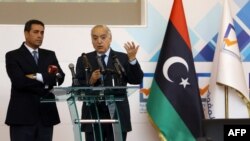Libyan electoral officials announced Wednesday the opening of a two-month voter registration period, though it is unclear when elections will next be held in the divided nation.
The United Nations is supporting the voter registration process as it seeks to reconcile rival factions and relaunch a political transition that would lead to new polls.
The U.N. Libya mission has previously said it hopes elections can be held by the end of next year, but has also acknowledged complex security, political and legislative challenges to organizing a vote.
Libya last held elections in 2014 but the results were disputed, deepening divisions that emerged after the country's 2011 uprising. The poll led to an escalation of armed conflict and to rival parliaments and governments being set up in the capital and the east.
Some Libyan political figures have called for elections as a way to break the deadlock after the stalling of a U.N.-backed peace deal signed in late 2015, with a new U.N. push to amend that deal so far producing no breakthrough.
U.N. Libya envoy Ghassan Salame expressed sympathy with that view at a joint press conference with Libya's High National Election Commission (HNEC) on Wednesday, calling elections "the best way to separate competitors."
"I heard a large number of those demanding elections, some of whom decided on the type of elections and some who left it vague," Salame said.
But he said certain conditions had to be met first, including electoral legislation being passed and Libyans agreeing to accept the results in advance.
"You do not want these elections to be another area of disagreement between Libyans," Salame said.
The voter registration period is aimed at updating the voter register and allowing citizens who have not registered in the past to do so, said HNEC head Emad Alsayah.
"The registration process will last for 60 days, and the extension of process can be considered as required," he said.
Libyans living abroad will be able to register online from Feb. 1.
Turnout in national elections in 2014 was low, with 630,000 out of the 1.5 million registered casting a vote.





